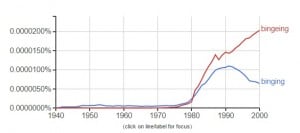A binge is an interval of time where one engages in an activity without limits. It is usually used in reference to eating or drinking alcohol.
To binge is to be excessive in an activity, most usually eating. In recent years this has expanded to watching television shows or movies in consecutive order. With video streaming services, entire seasons or collections of media is available at a single time and one can binge for an entire weekend. There is even a compound verb binge-watch, though the usage is common enough now that the clarifying ‘watch’ isn’t necessary.
The progressive tense is spelled either bingeing or binging.
As shown above by Google’s ngram viewer, the term rose in popularity starting about 1980. One could guess this had to do with the increased awareness and campaign against eating and drinking disorders. The two spellings were equal in frequency for a short time, but by the early 1990s the e spelling kept rising while the other fell lower. Of course, these results are limited to the books within Google’s database.
In actual usage, binging is used almost three times for every instance of bingeing. This could be because the ngram is limited to books, or that the words switched again since 2000. Either could be likely.
In the end, both spellings are correct and one should use the spelling that he or she is comfortable with, unless of course mandated by a style guide or editor.
Examples
He and Kim had lived a two-year nightmare watching Brandon’s binging and purging from an eating disorder. [The Sun Herald]
And Fox is hoping the ratings momentum will continue as folks get clued in with a bit of drip-drop viewing, or all-out bingeing — or those just wanting to relive the best of Cookie. [Los Angeles Times]


Comments are closed.